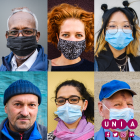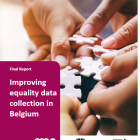Identifying and tackling problematic or abusive forms of police selectivity
Unia funded a research on police selectivity, conducted in collaboration with the National Institute of Criminalistics and Criminology (NICC) and the Brussels North police zone. Main conclusion? The management of a police zone has a strong impact on police practices. It is therefore at this level that we must work to improve the relationship between the police and the population.
Discriminatory profiling by law enforcement has long reflected the tendency to check and monitor groups who are potentially more criminogenic than others. Identity verification are supposed to guarantee public order. This approach raises certain questions. Although selective practices are part of the daily work of the police in the field, some of them can be problematic both in terms of their motivation and their impact on police work in a broader sense. We must question the message that the police force is sending to the population in general and to certain groups more specifically. A point of tension between police and citizens is whether the choice to carry out an identity check is the result of the individual discretion of the police officer, or whether it is a part of a mechanism that potentially results in discriminatory practices.
Co-constructed project
This is the purpose of the action research funded by Unia and conducted within the Brussels North police zone (PolBruNo), in collaboration with the police force and the National Institute of Criminalistics and Criminology (NICC).
The objective is twofold.
- It aims at initiating an examination of the individual or collective practices of the police based on signs of problematic selectivity.
- It examines the functioning of the organisation of the police zone.
Recommendation of Unia
The project provides material for further research and enables to draw conclusions and make recommendations that can benefit other police zones. In this sense, Unia's position paper is intended for experts from the police and civil-society organisations involved in improving the relationship between police forces and citizens. It aims at:
- contextualising the issue of checks, which constituted the starting point for this joint consideration
- explaining the specific nature of the PolBruNo zone which facilitated the implementation of the project
- highlighting particularly remarkable results and generating added value
- showing the recommendations drawn from the project by Unia, as a body whose mission is to combat discrimination and promote equality
Comparable publications
Annual report 2020: vulnerable human rights in times of crisis

In this extraordinary year, Unia continued to fight for human rights and equality. The corona pandemic acted like a magnifying glass. Those already in a vulnerable position were often the first or hardest hit by Covid-19 or its measures.
Situation of travelers in Belgium following police operation ‘Strike’ on 7 May 2019
The Council of Europe, the UN Special Rapporteur on minority issues and the European Commission must investigate whether the police and judiciary did not take excessive measures against travelers. That’s what Unia says in a report on the actions of the police and the judiciary during a large-scale investigation into car scam. The report lists a range of measures that have serious consequences for entire families.
Evaluation of federal anti-discrimination legislation (2017)
Article 52 of the Anti-Discrimination Law states that the application and effectiveness of the anti-discrimination laws must be assessed by the Legislative Chambers. Unia has prepared an assessment report on the Anti-Discrimination Law and the Anti-Racism Law based on its own practical experience, national jurisprudence and its general expertise in the fight against discrimination.
Data on (in)equality & discrimination in Belgium: results of the project ‘Improving equality data collection in Belgium’ (2021)

"Improving equality data collection in Belgium” (IEDCB) is a Belgian project co-funded by the Rights, Equality and Citizenship (REC) programme of the Directorate-General for Justice of the European Commission. It was realised thanks to a partnership between Unia and the Equal Opportunities Team of the Federal Public Service for Justice. The project aims to improve the collection and processing of equality data in Belgium.
